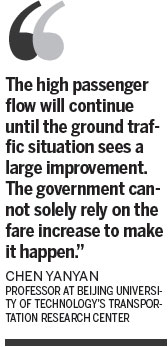There was a slight drop in subway passenger numbers on Monday, the first working day since ticket prices went up, according to the municipal authority.
The number of passengers on the subway by 9 am declined by 5.2 percent to 1.57 million, the Beijing Municipal Commission of Transport said.
On Sunday, when the price increase took effect, the drop in passengers was more noticeable. About 6.19 million people used the subway, a decline of 17.9 percent on the previous Sunday. There were also 8.6 percent fewer passengers using the buses on Sunday, the commission said.
However, to make public transportation more comfortable for passengers, authorities need to do more than raise fares, including preferential policies for buses and other ground-level traffic, an expert has suggested.
Beijing has increased the price of its public transportation tickets for the first time in seven years. The minimum metro price is now 3 yuan (48 US cents), up from the flat rate of 2 yuan with unlimited transfers. Bus tickets now cost 2 yuan for up to 10 kilometers, then 1 yuan for every additional 5 km.
"I noticed no improvement in the subway car on my journey - it was as crowded as before and only cost more," said Sun Li, a high school teacher in Beijing. She added that she paid 6 yuan more for her commute on Monday but still did not have room to move in the morning rush hour.
"The fare increase should bring more than just an increase in our traveling costs," the 36-year-old Beijing resident said. "I thought the fare increase would reduce the passengers to give us more space during our commute."
Many other commuters voiced similar concerns about the fare changes. One of the targets of the new fare structure is to provide more comfortable travel for metro passengers. The higher fares are expected to attract some to take the bus or find other ways to commute, as the municipal economy planning body said in its announcement.
Kong Linghai, who took part in the hearing on fare changes in October, supported the increase in fares, but now he has doubts.
"We expected a better situation," said Kong, who spends 14 yuan every day. "I hope the traffic on roads can be improved, with less congestion. If so, I will change to taking buses at less cost."
The large passenger numbers in the metro may remain for a long time, said Chen Yanyan, a professor at Beijing University of Technology's Transportation Research Center.
"The higher fares cannot reduce the daily commuters since the metro is their major means of travel, and can guarantee punctuality for work," she said. "So the high passenger flow will continue until the ground traffic situation sees a large improvement. The government cannot solely rely on the fare increase to make it happen."
The municipal government should introduce more preferential policies to improve the bus system, such as giving buses more bus lanes to guarantee smooth traffic flow on the roads, she said. Then more passengers will use buses, she said.
zhengjinran@chinadaily.com.cn

(China Daily 12/30/2014 page4)
